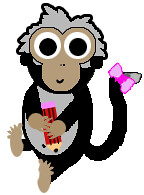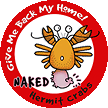Here's what I wrote for this week's reflection Malleable Nature after some thought booster from the talk I attended. I was most mentally challenged by Frans de Waal's speech. Hopefully my teacher would put his powerpoint online and I could share it with all of you!
Monkeys be damned. Apparently we're the "out-group", lower than those higher primates of apes and chimpanzees. Thus the discriminations continues.
Hopefully I will share my account of today's very exciting day with all of you later. But a brief of that would be:
1) being introduced to de Waal and Thompson by my prof
2) asking de Waal and Thompson some very intelligent or maybe not so intelligent questions. de Waal made me feel proud to be a monkey - empathy and evolution of morality coming from the social responses of monkeysapes afterall. So when I responsed to that photo of the dog being empathetic to a lil girl, that's just the monkey in me responding in empathy? Proud of the animal in me.
(note to self: de Waal does not believe in the possibility of world peace. he thinks that surely there will be ingroups and outgroups. the egalitarian notion seems to be against monkeyape instinct. it would not be beneficial for random altruism to occur are his exact words i believe. it must be targeted and must serve certain benefits. so there goes my hope of world peace and reconciling the ingroups and outgroups by effectively ending all discrimination. And there I was about to lament the need for hierachies in this world. From social hierachies to taxonomical hierachies... why?!)
3) meeting some research assistants of the program
4) meeting a singaporean grad student at UCSB studying evolutionary psychology in anthropology. He was an english major at oxford who taught in HCJC for 8 years before getting a fellowship at UCSB!
5) bumping into a classmate on the bus home
-=-=-=-=-=-
"Although this week theme’s Malleable Nature was never dubbed “difficult” in lectures or section unlike last week’s Emergent Nature, I personally found this week’s theme to be extremely challenging.
It was not challenging so much that I could not grasp the concepts or digest the facts. In fact, it was the clarity of the complexity that twisted my brain into a giant ball of noodles. It challenges categories and “boxes” that we fit things around us in, a tool that we were taught from young to make sense of the things around us. Yet the fact is that, this week’s class laid it so clear that there is no clear distinction between “natural” and “artificial” but yet we still continue to cling on to that desperate need to try to fit a circle into a square. Could it simply be that we, or our brains, require a comprehensive filing cabinet in which we put away sets of information for easy reference in the future? Surely if we were told that there is no clear distinction between a computer and a human, or between a grain and a robot, not only do we need complete reprogramming of our conditioned responses, we would surely go into convulsion due to the level of implications and mostly the lost of human dominance in our environment. Of course, if we could start from scratch in a totally different paradigm, where we could recondition all our programmed responses, such a possibility of accepting Malleable Nature could be possible. However, at this stage in our biological, social and cultural evolution, suggesting that we are no different from a human construct such as a machine or a computer, or between what we commonly see as part of the untouched environment, nature as opposed to something nurtured, to actually not exist at all, it would rather cause the end of hope in our society. It surely stirred such emotions in me as I read Anderson’s article where she wrote that the process of domestication, the earliest process of human intervention in changing ‘nature’ began “some 1100 years ago when Neolithic peoples began to domesticate select species of plants and animals.” Of course ‘nature’ in inverted commas because really, we don’t know what we can or cannot call ‘natural’ anymore.
Let’s speak of human nature then. What is natural human nature? The animal instincts in us or our superior possession of self-awareness, consciousness and morality? These animal instincts that we try so much to suppress and alter may be as Frans de Waal speak of in the talk “Primate, Monks and the Mind” to be the source of our human empathy and morality! Instead, now we try to engage in a show of dominance by trying to “play god” and alter nature. In a display of omnipotence, humans try to engineer everything from machines to grains to our human offspring! Again, this need to repress the “animal” in us is aided by our ability to genetically modify our children or perhaps by our making humanoids that would represent only the “best parts” of human nature – our ability to love (per the movie A.I.).
However, once the idea that we are blurring the distinction between natural and artificial begins to occur to the masses, the fear of losing our control and dominance begins to spark fears in people. The media seem to exaggerate these fears while scientists like Dr Foltz emphasizes the aims of “pharming” as pharmaceutical rather than an attempt to play god in cloning humans.
This need for control may not be so exaggerated (in terms of a Lynn White paradigm) but if we think of it in terms of animalistic terms of “in-groups” or “out-groups”, our animal instinct prevails in requiring that we focus on benefiting only our human groups and keeping other groups of animals or even machines beyond our realm.
Is the morality or ethical question about genetic engineering or stem cell research really about whether it is right for us to play such a direct role over natural selection or is it just a cautionary alarm going off in our animal core? Or perhaps it is just a resistance towards a paradigm shift of accepting the startling idea of human genomes in sheep? How about eating genetically modified food? Could this be simply a lack of information to aid in this paradigm shift and reconditioning? Surely in a few decades, humans would be accepting the ideas of cultivating or farming stem cells for leukemia patients in farm animals just as we have accepted this widespread dominance of machines in our lives when decades ago, the idea of mass ownership of automobiles would never have occurred to our parents. We are taking domestication to new grounds. What else can we farm next? Or could we farm enlightenment instead and hope to proliferate higher awareness to the masses? Or is that what religious institutions have been trying to do in their own ways for centuries – trying to farm a thought in millions?"
Monday, February 14, 2005
An Abstract of thoughts
Posted by
Monkey
at
Monday, February 14, 2005
![]()

 I can be contacted at
I can be contacted at 







No comments:
Post a Comment